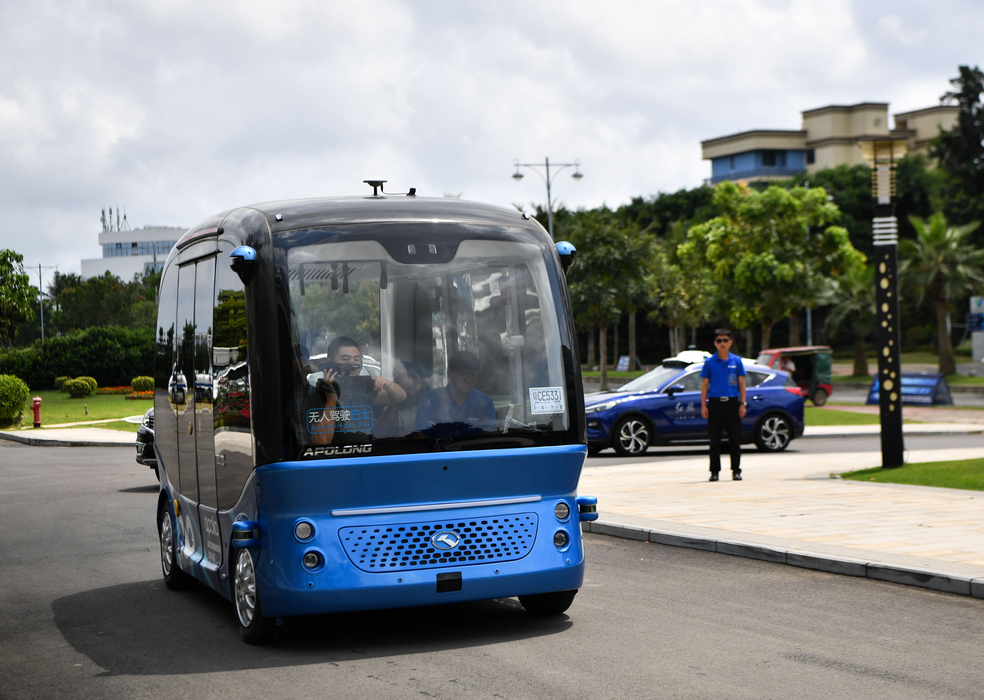BEIJING, July 16 (Xinhua) -- Driven by technology innovation and incentive policies, China's Internet of Vehicles (IoV) market with an estimated size of more than 100 billion yuan is growing at a faster pace with greater development opportunities.
Accelerated application
China's automobile industry has been undergoing profound changes in an era featuring interconnection of everything. In recent years, with advancement of electrification, intelligent transformation, network connection and sharing modes in the automotive industry, the country's IoV is seeing faster development.
Specifically, IoV uses new generation of information and communication technologies to realize the interconnection of vehicles and the link with other factors such as users, roads and service platforms. With improved overall intelligent driving capabilities, IoV offers users with safe, comfortable, intelligent and efficient driving experience and traffic service, enhances traffic operation efficiency, and makes social transportation services smarter.
Recently, IoV saw another major milestone event. On July 3, the 3rd Generation Partnership Project (3GPP), an organization generating all the specifications for cellular networks, announced the freeze of 5G Release 16 (R16) specification. According to industry insiders, the completion of R16 means 5G will be applied to connect not only people with people, but also people with things, and things with things. This would lay a foundation for the accelerated industrialization of Internet of things (IoT) and IoV.
In the field of IoV, 3GPP R16 is expected to support vehicle-to-vehicle (V2V) and vehicle-to-infrastructure (V2I) direct connection communications, and realize semi-automatic driving, extension sensor, remote driving and other IoV application scenarios, according to a research report of Shanghai Securities.
IoV will gain more support from the promotion of industry standards. Large-scale investment in the sector is expected to start from 2021, stated Pacific Securities.
The market size of China's IoV industry was 48.6 billion yuan in 2018. It is expected to grow at an annual compound rate of 28.1 percent to reach 115 billion yuan in 2021, according to CCID Consulting, a consultancy under the Ministry of Industry and Information Technology (MIIT).
Policy support
Chinese authorities have successively issued policies in recent years to promote IoV development.
In February this year, the National Development and Reform Commission and other departments jointly released a strategy for the innovation and development of intelligent vehicles. The strategy clearly pointed out that by 2025, China's IoV systems concerning technological innovation, industrial ecology, infrastructure, regulations and standards, product supervision and network security will be basically formed.
MIIT will boost the coordinated development of 5G IoV and promote the integration of IoV into national new information infrastructure construction projects, according to the ministry's notice on promoting the accelerated development of 5G released in March.
Local governments have also rolled out policies and plans to push ahead the development of IoV. For example, east China's Jiangsu Province vowed to top other provinces and regions across the country in terms of IoV (and intelligent connected vehicles, ICV) technology level and industrial scale in 2021, and build itself into a national hub of critical IoV industrial clusters in 2025 with user penetration rate reaching more than 60 percent.
Shenyang city in northeast China's Liaoning Province intended to carry out 5G IoV coordinated development projects. It planned to establish 5G IoV demonstration parks and testing fields, build a digital platform for vehicle-road information exchange, traffic information management and public travel service management, and encourage vehicle manufacturers to carry out remote control, automatic driving, intelligent parking and other ICV application tests, so as to create an intelligent auto ecosystem with local characteristics.
Benefits to industrial chain
Under the influence of comprehensive factors such as the increasingly improved 5G technology and infrastructure, popularity of automotive electronics and rapid development of electric vehicles, the rising IoV market in China is driving the growth of relevant fields in the industrial chain.
Hardware manufacturing is the first IoV-relevant industry to form a complete industrial chain and application market. With continuous development of IoV technology and the expansion of application scope, the demand for hardware will continue to increase, bringing benefits to related companies, according to Kaiyuan Securities.
Guosen Securities held that driven by expansion of IoV market, multiple segments such as automobile comprehensive diagnosis, commercial vehicle on-board monitoring, V2X, intelligent driving and intelligent parking will embark on a fast lane of development.
In addition, electronic toll collection (ETC), high-precision map, Beidou navigation, traffic camera, intelligent lights, exhaust gas monitoring, automobile radar, and vehicle camera will also benefit from the development of IoV, said Shanghai Securities. (Edited by Su Dan with Xinhua Silk Road, silviasu07@163.com)




 A single purchase
A single purchase









